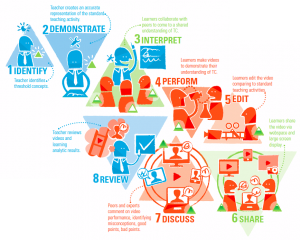JuxtaLearn is a 3-year EU-funded project that has just passed the one-year mark and we are currently working to implement the technical aspects of the JuxtaLearn Process that we have developed.
In our presentation we give a little more detail about the challenges and findings from our first year. We showcase some of the videos made by the partners in the project to express their vision. One of these, the Teddy video, describes our efforts to come to a shared understanding of the project between the partners on the project, as well as introducing the workshops we held with teachers in school.

The goal of the JuxtaLearn Project is to enable students to overcome barriers to science and technology learning by exploring and sharing their understanding using creative video performance. By engaging student curiosity in difficult-to-learn science and technology subjects, the JuxtaLearn Process supports them along a creative route to a deeper understanding of topics that the teachers have identified as particularly problematic. The JuxtaLearn Process is illustrated, graphically, in Figure 1.

When we started working with teachers, they easily understood the idea of Threshold Concepts in science and technology subjects because they struggle with these every teaching day. They referred to them as Tricky Topics. Often, the students appear to have understood the concepts in class, but gaps in their understanding emerge when they have to apply what they have learned either in practice or in a test. Each Tricky Topic (Threshold Concept) can be broken down into a set of Stumbling Blocks that students commonly trip over.
The Teacher Workshops helped us develop the JuxtaLearn Taxonomy, to support the teachers in uncovering the causes of student misunderstandings. Identifying the Threshold Concept and its consitutent Stumbling Blocks clarifies What it is that the students have failed to understand; classifying the Stumbling Blocks according to the JuxtaLearn taxonomy reveals Why it is that the students have misunderstood.
The science teachers were less certain about the value of the creative video (Stage 3 and Stage 4 of the JuxtaLearn Process). Getting students to make videos (in the style of YouTube), even though this activity would be closely coupled to the Threshold Concept through a pedagogical palette of stumbling blocks, was outside their teaching experience. Until, that is, they took part in the JuxtaLearn Video and Tabletop Editing workshop.
In this workshop, the students were grouped into two groups of about six students per group to storyboard, create and edit a video on the chemistry Threshold Concept of ‘moles’. Ultimately in this project the storyboarding and editing activities will all take place on a tabletop, however for the purposes of this workshop the students had a paper prototype storyboarding tool which contained a list of the stumbling blocks for moles that they could address in their videos, the tabletop was used for editing.
Students, teachers and researchers were impressed by the results. Catcher Media put together a short Work Package 3 video which included clips that the students had created. The teachers were amazed at how the students stayed on topic, how they explored their understanding, how they helped each other as they identified gaps in each other’s understanding and, most importantly, how the process highlighted areas where the students had fundamentally misunderstood and which the teacher could then raise again in class.
The first year has been very exciting. As we move into year 2, we are starting to develop the technical work packages, the webspace, the tabletop editing, the large screen displays with support for peer feedback and commenting. Details will be provided on the JuxtaLearn Website as they become available. It is very rewarding to see our first year’s efforts taking shape through the implementation of a real useable system.
Gill Clough is a Research Associate on the JuxtaLearn Project working in the Institute of Educational Technology (IET) at the Open University. She is currently working on Work Package 2, Pedagogical Requirements.
Anne Adams is a Senior Lecturer in the IET, Principal Investigator on the JuxtaLearn project, and a co-Investigator on the OU's Public Engagement with Research Catalyst.

